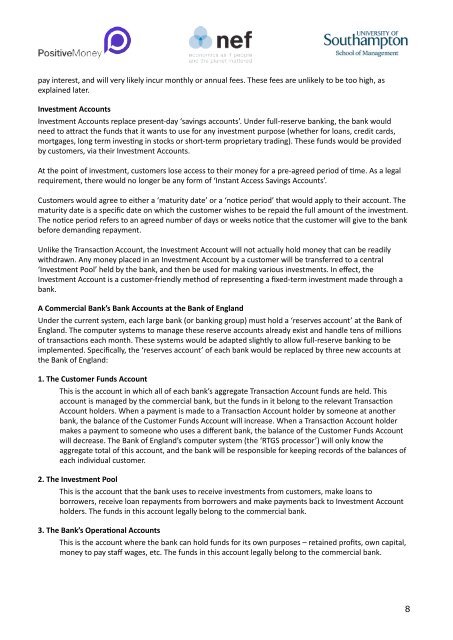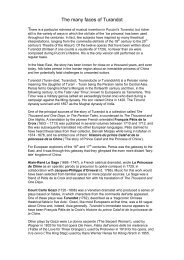NEF-Southampton-Positive-Money-ICB-Submission
NEF-Southampton-Positive-Money-ICB-Submission
NEF-Southampton-Positive-Money-ICB-Submission
You also want an ePaper? Increase the reach of your titles
YUMPU automatically turns print PDFs into web optimized ePapers that Google loves.
pay interest, and will very likely incur monthly or annual fees. These fees are unlikely to be too high, as<br />
explained later.<br />
Investment Accounts<br />
Investment Accounts replace present-‐day ‘savings accounts’. Under full-‐reserve banking, the bank would<br />
need to aOract the funds that it wants to use for any investment purpose (whether for loans, credit cards,<br />
mortgages, long term invesGng in stocks or short-‐term proprietary trading). These funds would be provided<br />
by customers, via their Investment Accounts.<br />
At the point of investment, customers lose access to their money for a pre-‐agreed period of Gme. As a legal<br />
requirement, there would no longer be any form of ‘Instant Access Savings Accounts’.<br />
Customers would agree to either a ‘maturity date’ or a ‘noGce period’ that would apply to their account. The<br />
maturity date is a specific date on which the customer wishes to be repaid the full amount of the investment.<br />
The noGce period refers to an agreed number of days or weeks noGce that the customer will give to the bank<br />
before demanding repayment.<br />
Unlike the TransacGon Account, the Investment Account will not actually hold money that can be readily<br />
withdrawn. Any money placed in an Investment Account by a customer will be transferred to a central<br />
‘Investment Pool’ held by the bank, and then be used for making various investments. In effect, the<br />
Investment Account is a customer-‐friendly method of represenGng a fixed-‐term investment made through a<br />
bank.<br />
A Commercial Bank’s Bank Accounts at the Bank of England<br />
Under the current system, each large bank (or banking group) must hold a ‘reserves account’ at the Bank of<br />
England. The computer systems to manage these reserve accounts already exist and handle tens of millions<br />
of transacGons each month. These systems would be adapted slightly to allow full-‐reserve banking to be<br />
implemented. Specifically, the ‘reserves account’ of each bank would be replaced by three new accounts at<br />
the Bank of England:<br />
1. The Customer Funds Account<br />
This is the account in which all of each bank’s aggregate TransacGon Account funds are held. This<br />
account is managed by the commercial bank, but the funds in it belong to the relevant TransacGon<br />
Account holders. When a payment is made to a TransacGon Account holder by someone at another<br />
bank, the balance of the Customer Funds Account will increase. When a TransacGon Account holder<br />
makes a payment to someone who uses a different bank, the balance of the Customer Funds Account<br />
will decrease. The Bank of England’s computer system (the ‘RTGS processor’) will only know the<br />
aggregate total of this account, and the bank will be responsible for keeping records of the balances of<br />
each individual customer.<br />
2. The Investment Pool<br />
This is the account that the bank uses to receive investments from customers, make loans to<br />
borrowers, receive loan repayments from borrowers and make payments back to Investment Account<br />
holders. The funds in this account legally belong to the commercial bank.<br />
3. The Bank’s OperaPonal Accounts<br />
This is the account where the bank can hold funds for its own purposes – retained profits, own capital,<br />
money to pay staff wages, etc. The funds in this account legally belong to the commercial bank.<br />
8



